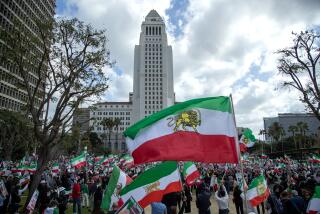Pitch perfect on Iran
- Share via
Three days after Iran’s disputed presidential election, as protesters took to the streets, President Obama offered a reserved statement: He was “troubled” by the violence but pledged noninterference. On Tuesday, he changed his tone only slightly, condemning the crackdown but neither denouncing the fraudulent election nor openly hoping for regime change.
The administration’s muted response has increasingly come under attack. How, critics ask, can the U.S. stand idly by while Iranian President Mahmoud Ahmadinejad’s vote-rigging regime attacks protesters? How could Obama remain lamely on the wrong side of history?
In fact, the critics are wrong and the administration is right.
As Obama has argued, tarring the opposition with U.S. support would only strengthen the regime without helping the protesters. Already, Iran’s supreme leader, Ayatollah Ali Khamenei, has blamed the U.S. for backing the dissidents. Why give his false accusations real ammunition? Especially when backing the protesters would neither deter the crackdown nor embolden the opposition.
As Duke University political scientist Timur Kuran has argued, the success of revolutions is a function of the relationship between individuals’ private opinions of the government and the level of public support for the opposition. Most people will take to the streets only when they judge public sentiment to be sufficiently aligned against the government. Only then is it safe to act on once-private anti-government preferences. Once enough people collectively make the decision to come out of the closet, a revolution can commence. In Iran, public sentiment has already revealed itself, and Iranians’ private sentiments exist independent of the U.S. government’s position on their election.
Say Obama did what his critics want. What would happen? Imagine you are a progressive, twentysomething Mir-Hossein Mousavi supporter who hates the regime but has decided -- out of laziness or self-interest -- not to join the protests. You flip on Al Jazeera and see Obama expressing support for the opposition. You may feel grateful. But your decision whether to join your compatriots outside has already been made, and the calculus is unlikely to change. Knowing the U.S. is behind you will not thicken your skull against a Basiji baton.
Furthermore, Obama’s words will only inspire those who are pro-American to begin with. But a February 2008 survey by the Program on International Policy Attitudes at the University of Maryland found that only 15% of respondents thought “very favorably” of the American people. Even when asked to distinguish between the U.S. government and the U.S. as a country, only 43% of self-described “reformers” held favorable views. Mousavi’s ranks are more pro-American than the regime, but they no doubt include many who are not fans of the U.S.
There are critics of Obama’s silence who realize all this, who understand that Washington can do little to affect what is essentially a domestic Iranian affair. Still, they want Washington to say something -- anything -- in support of democracy in Iran. Regardless of the outcome in Iran, they argue, the United States simply must stay faithful to its own values. Anything else would be un-American.
There may be a time for harmless and empty pro-democracy rhetoric, a time when it is worth promoting American values and shameful to conceal them. Speaking up for democracy makes sense when there are no costs to doing so: when a country’s revolutionary tide has already turned, or when an incumbent regime is strategically irrelevant.
But when it comes to supporting the demonstrators in Iran, words would be, at best, meaningless and, at worst, counterproductive. Smartly, Obama is forsaking concerns about standing on the right side of history in favor of pragmatism. Let’s hope he keeps his mouth shut.
More to Read
Sign up for Essential California
The most important California stories and recommendations in your inbox every morning.
You may occasionally receive promotional content from the Los Angeles Times.










